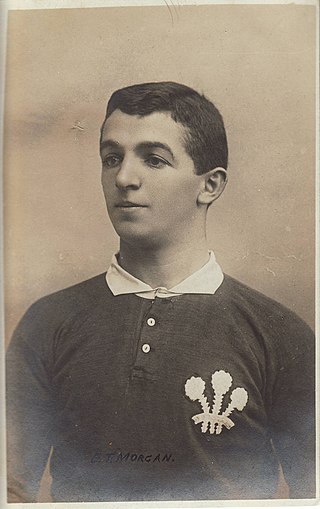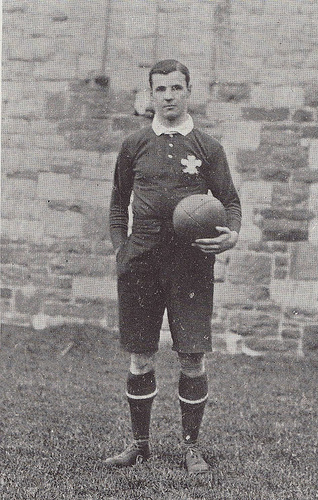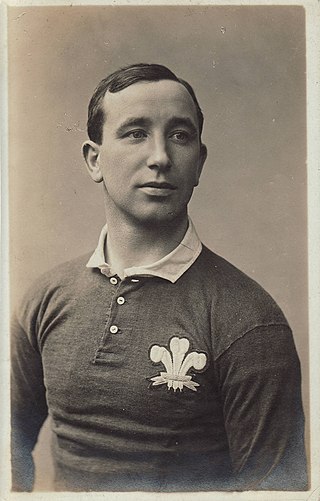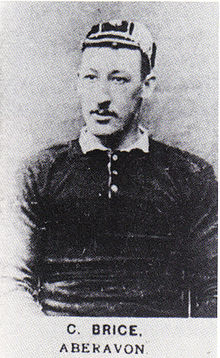
Erith Gwyn Nicholls was a Welsh rugby union player who gained 24 caps for Wales as a centre. Nicholls was known as the "Prince of Threequarters".

Rhys Thomas "Rusty" Gabe born as Rees Thomas Gape, was a Welsh rugby union player who played club rugby for Llanelli, London Welsh and Cardiff and gained 24 caps for Wales, mainly as a centre.

William James Trew, better known as Billy Trew was a Welsh international centre, outside half and wing who played club rugby for Swansea Rugby Football Club. He won 29 caps for Wales and is seen as one of the key players of the first Golden Age of Welsh rugby union

Arthur Flowers Harding was an English-born international rugby union player who played for and captained the Wales national team. Often called 'Boxer' Harding, he was a member of the Wales team for the famous Match of the Century, who beat the 1905 touring All Blacks in a game considered one of the greatest in the history of rugby union. He played club rugby for Cardiff and London Welsh and county rugby for Middlesex.

Dicky Owen was a Welsh international scrum-half who played club rugby for Swansea RFC Owen is seen as one of the greatest Welsh scrum-halves and won 35 caps for Wales between 1901 and 1912, a record that was unbeaten until 1955 when Ken Jones surpassed him.

Edward Morgan was a Welsh international rugby union player. He was a member of the victorious Wales team who beat the 1905 touring All Blacks in the famous Match of the Century and is remembered for scoring the game's winning try. He played club rugby for London Welsh and Swansea.

Joseph Jehoida Hodges was a Welsh international rugby union player. He was a member of the winning Welsh team who beat the 1905 touring All Blacks in the famous Match of the Century. He played club rugby for London Welsh and Newport RFC.

William Morris Llewellyn was a Welsh international rugby union player. He captained Wales in 1905 and London Welsh in 1902. He was a member of the winning Welsh team who beat the 1905 touring All Blacks in the famous Match of the Century. Llewellyn toured with the British Isles to Australasia in 1904 and won three Triple Crown trophies. He played club rugby for many teams, predominantly for Llwynypia and Newport.

Major Thomas Henry Vile MBE was a Welsh international rugby union player. He played club rugby predominantly for Newport, captaining the side twice and played county rugby for Monmouthshire. He also represented the British Isles in Australia, and after retiring from playing became an international referee. He fought in both World Wars, became a president of the Welsh Rugby Union, was a Justice of the Peace, businessman and High Sheriff of Monmouthshire.

William James Bancroft was a Welsh international fullback, who played club rugby for Swansea, and a county cricketer for Glamorgan, for whom he was the first professional player in 1895.

Richard Hughes Jones was a Welsh international fly-half who played club rugby for Swansea Rugby Club. He won 15 caps for Wales and played county rugby for Glamorgan.

George Llewellyn Lloyd was a Welsh international half-back who played club rugby for Newport and county rugby with Kent. He won 12 caps for Wales and captained the team on one occasion against Scotland.

John George Boots (1874–1928) was a Welsh international rugby union forward who played club rugby for Newport and county rugby with Monmouthshire. He won 16 caps for Wales.

| repyears1 = 1895–1900 | repcaps1 = 9 | reppoints1 = 0 | ru_ntupdate = | coachteams1 = | coachyears1 = | ru_coachupdate = | relatives = Norman Biggs, brother
Cecil Biggs, brother }}

John "Jere" Blake was a Welsh rugby union forward who played club rugby for Cardiff and international rugby for Wales. He was part of the 1900 Wales Triple Crown winning team.

Thomas Williams was a Welsh rugby union forward who played club rugby for Cardiff and Pontypridd and international rugby for Wales. A solicitor by profession, Williams would later become a national selector for the Welsh Rugby Union. Williams was also responsible for suggesting the singing of the Welsh national anthem in a match in 1905, the first time a national anthem was sung before a sporting event.

Daniel Rees was a Wales international rugby union and rugby league centre who played club rugby for Swansea and Hull Kingston Rovers. Thomas was a twice Triple Crown winner, after representing Wales during the 1900 and 1905 Home Nations Championships. Later in his career he switched to professional rugby league, joining Hull Kingston Rovers. He was described as a "speedy threequarter with a deceptive action", and would have won more than his five international caps had he not been in competition with Gwyn Nicholls for the centre position.
John "Bala" Jones was a Wales international rugby union scrum-half who played club rugby for Aberavon and Devonport Albion RFC and county rugby for Glamorgan and Devon. He won just a single international cap, in 1901.
Denys Douglas Dobson was an English international rugby union forward who played club rugby for Oxford University and Newton Abbot. Dobson played international rugby for England and the British Isles team on its 1904 tour of Australia. Dobson was the first player from a British touring rugby team to be dismissed from the playing field, when he was sent off in a match against the Northern District in Newcastle, New South Wales.

Howell Jones was a Welsh rugby union forward who played for the rugby club Neath and county rugby for Glamorgan. He gained just a single cap for the Wales national team in 1904. Jones came from a sporting family, and his son, Howie Jones, also represented Wales in rugby union.
















